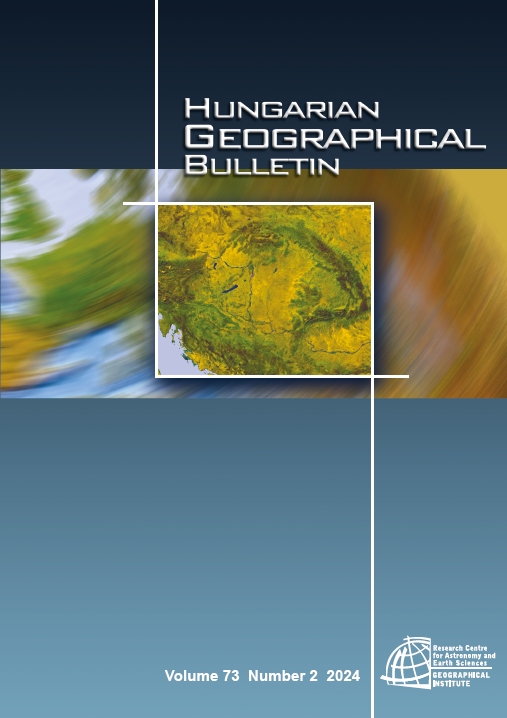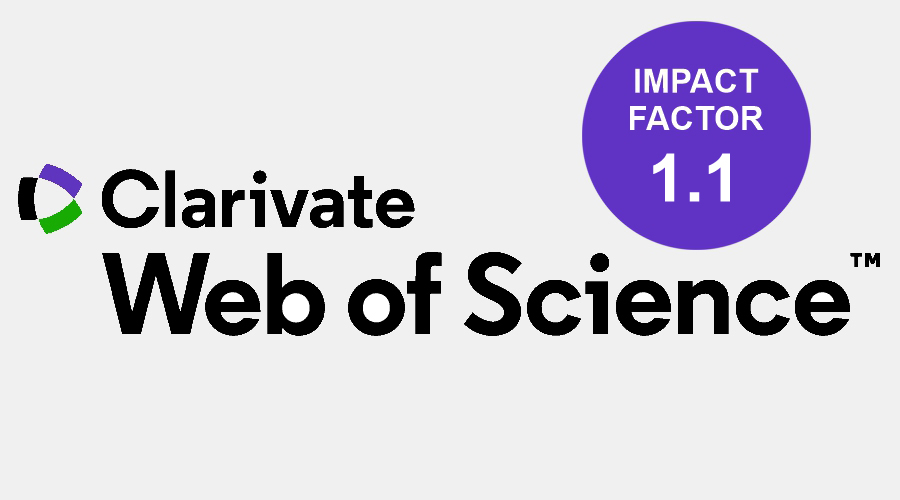Effects of recreational and residential functional land use on urban soils
Abstract
Soils in residential areas of cities are heavily degraded, and the environmentally protective and formative functions are instead realized by the soils in recreational areas (city parks, etc.). The study aimed to analyse the influence of functional land use and the level of anthropogenic impact on the properties of anthropogenic horizons (Au and Aτ) in the city of Volgograd, Russia. In this study, we analysed 50 soil samples from the city’s recreational and residential functional areas under field and laboratory conditions. The study evaluated the morphological aspects (thickness, colour, structure, and presence of artefacts), physical properties (bulk density, texture), and chemical properties (pHwater, salt content, CaCO3, Corg, SOCstoc)of the soils. The anthropogenic Au horizons in residential areas exhibited a clumpy structure, numerous artefacts, and significant compaction. Conversely, the soils in recreational zones contained fewer anthropogenic artefacts, with the Aτ horizons characterized by a lumpy structure. The anthropogenic horizons’ median and mean property values in the functional zones showed significant differences. The acid-alkaline properties of the studied horizons were weakly alkaline in recreational areas and alkaline in residential areas. A common feature of all anthropogenic horizons was the variability in chemical, physical, and morphological properties depending on the functional zone and level of anthropogenic load. The indicators of a specific level of anthropogenic impact on urban landscapes included horizon thickness, Corg content, colour, and structure.
References
ADELANA, A.O., AIYELARI, E.A., OLUWATOSIN, G.A. and KAYODE, S.A. 2023. Soil properties that differentiate urban land use types with different surface geology in Southwest Nigeria. Urban Ecosystems 26. (1): 277–290. https://doi.org/10.1007/s11252-022-01301-z
ARINUSHKINA, E.V. 1962. Manual on Chemical Analysis of Soils. Moscow, Moscow State University Publishing House. (in Russian)
BEZUGLOVA, O.S., TAGIVERDIEV, S.S. and GORBOV, S.N. 2018. Physical properties of urban soils in Rostov agglomeration. Eurasian Soil Science 51. 1105–1110. https://doi.org/10.1134/S1064229318090028
BLUME, H.P. 1989. Classification of soils in urban agglomerations. Catena 16. (3): 269–275. https://doi.org/10.1016/0341-8162(89)90013-1
BREVIK, E.C. and FENTON, T.E. 2012. Long-term effects of compaction on soil properties along the Mormon Trail, South-Central Iowa, USA. Soil Horizons 53. (5): 37–42. https://doi.org/10.2136/sh12-03-0011
BURGHARDT, W. 2006. Soil sealing and soil properties related to sealing. Geological Society London Special Publications 266. (1): 117–124. https://doi.org/10.1144/GSL.SP.2006.266.01.09
CAMBOU, A., SHAW, R.K., HUOT, H., VIDAL-BEAUDET, L., HUNAULT, G., CANNAVO, P., NOLD, F. and SCHWARTZ, C. 2018. Estimation of soil organic carbon stocks of two cities, New York City and Paris. Science of the Total Environment 644. 452–464. https://doi.org/10.1016/j.scitotenv.2018.06.322
CHARZYŃSKI, P., BEDNAREK, R., HUDAŃSKA, P. and ŚWITONIAK, M. 2018. Issues related to classification of garden soils from the urban area of Toruń. Poland. Soil Science and Plant Nutrion 64. 132–137. https://doi.org/10.1080/00380768.2018.1429833
CHUPINA, V.I. 2020. Anthropogenic soils of botanical gardens. Review. Eurasian Soil Sciences 53. (4): 523–533. https://doi.org/10.1134/S1064229320040043
DE LUCIA, B., CRISTIANO, G., VECCHIETTI, L., REA, E. and RUSSO, G. 2013. Nursery growing media: Agronomic and environmental quality assessment of sewage sludge-based compost. Applied and Environmental Soil Science. Special Issue. ID565139. https://doi.org/10.1155/2013/565139
DELBECQUE, N., DONDEYNE, S., GELAUDE, F., MOUAZEN, A.M., VERMEIR, P. and VERDOODT, A. 2022. Urban soil properties distinguished by parent material, land use, time since urbanization, and pre-urban geomorphology. Geoderma 2022B, 413. 115719. https://doi.org/10.1016/j.geoderma.2022.115719
DMITRIEV, E. 1995. Mathematical Statistics in Soil Science. Moscow, Moscow State University Publishing House. (in Russian)
DVORNIKOV, Y.A., VASENEV, V.I., ROMZAYKINA, O.N., GRIGORIEVA, V.E., LITVINOV, Y.A., GORBOV, S.N., DOLGIKH, A.V., KORNEYKOVA, M.V. and GOSSE, D.D. 2021. Projecting the urbanization effect on soil organic carbon stocks in polar and steppe are-as of European Russia by remote sensing. Geoderma 399. 115039. https://doi.org/10.1016/j.geoderma.2021.115039
ELVIDGE, C.D., TUTTLE, B.T. and SUTTON, P.C. 2007. Global distribution and density of constructed impervious surfaces. Sensors 7. 1962–1979. https://doi.org/10.3390/s7091962
FAO 2006. Guidelines for Soil Description. Rome, Food and Agriculture Organization of the United Nations. https://openknowledge.fao.org/handle/20.500.14283/a0541e
FAO 2017. Soil Organic Carbon: The Hidden Potential. Rome, Food and Agriculture Organization of the United Nations. Available at https://openknowledge.fao.org/handle/20.500.14283/i6937en
GORDIENKO, O., BALKUSHKIN, R., KHOLODENKO, A. and IVANTSOVA, E. 2022. Influence of ecological and anthropogenic factors on soil transformation in recreational areas of Volgograd, Russia. Catena 208. 105773. https://doi.org/10.1016/j.catena.2021.105773
GREINERT, A. 2015. The heterogeneity of urban soils in the light of their properties. Journal of Soils and Sediments 15. 1725–1737. https://doi.org/10.1007/s11368-014-1054-6
HOWARD, J. and ORLICKI, K. 2015. Composition, micromorphology and distribution of microartifacts in anthropogenic soils, Detroit, Michigan, USA. Catena 138. 103–116. https://doi.org/10.1016/j.catena.2015.11.016
HUOT, H., JOYNER, J., CÓRDOBA, A., SHAW, R.K., WILSON, M.A., WALKER, R. and CHENG, Z. 2016. Characterizing urban soils in New York City: Profile properties and bacterial communities. Journal of Soils and Sediments 17. (2): 393–407. https://doi.org/10.1007/s11368-016-1552-9
IUSS Working Group WRB 2022. World Reference Base for Soil Resources. International Soil Classification System for Naming Soils and Creating Legends for Soil Maps. 4th edition. Vienna, Austria, International Union of Soil Sciences (IUSS). https://www.isric.org/sites/default/files/WRB_fourth_edition_2022-12-18.pdf
JIM, C. 1987. Trampling impacts of recreationists on picnic sites in a Hong Kong country park. Environmental Conservation 14. (2): 117–127. https://doi.org/10.1017/S0376892900011462
JIM, C. 1998. Urban soil characteristics and limitations for landscape planting in Hong Kong. Landscape Urban Plan 40. 235–249. https://doi.org/10.1016/S0169-2046(97)00117-5
JIM, C. and NG, Y. 2018. Porosity of roadside soil as indicator of edaphic quality for tree planting. Ecological Engineering 120. 364–374. https://doi.org/10.1016/j.ecoleng.2018.06.016
KACHINSKY, N.A. 1958. Mechanical and Micro-agregate Composition of Soils. Methods for Study. Moscow, USSR Academy of Science Publishers. (in Russian)
KASIMOV, N.S., VLASOV, D.V., KOSHELEVA, N.E. and NIKIFOROVA, E.M. 2016. Geochemistry of Landscapes of Eastern Moscow. Moscow, APR. (in Russian)
KHALIDY, R., ARNAUD, E. and SANTOS, R.M. 2022. Natural and human-induced factors on the accumulation and migration of pedogenic carbonate in soil: A review. Land 11. 1448. https://doi.org/10.3390/land11091448
LAM, K-C., NG, S., HUI, W. and CHAN, P. 2006. Environmental quality of urban parks and open spaces in Hong Kong. Environmental Monitoring & Assessment 11. (1–3): 55–73. https://doi.org/10.1007/s10661-005-8039-2
LORENZ, K. and KANDELER, E. 2005. Biochemical characterization of urban soil profiles from Stuttgart, Germany. Soil Biology and Biochemistry 37. (7): 1373–1385. https://doi.org/10.1016/j.soilbio.2004.12.009
MAZUREK, R.. KOWALSKA, J., GĄSIOREK, M. and SETLAK, M. 2016. Micromorphological and physico-chemical analyses of cultural layers in the urban soil of a medieval city – A case study from Krakow, Poland. Catena 141. 73–84. https://doi.org/10.1016/j.catena.2016.02.026
MINEEV, V.G. 2001. Determination of organic carbon in the soil by the Nikitin method with a colorimetric ending according to Orlov-Grindel. In Workshop on Agrochemistry: Textbook Allowance. 2nd edition. Sankt Petersburg, Publishing House of Moscow State University, 220–221.
NOVÁK, T.J., BALLA, D. and KAMP, J. 2020. Changes in anthropogenic influence on soils across Europe 1990–2018. Applied Geography 124. 102294. https://doi.org/10.1016/j.apgeog.2020.102294
NOWAK, D.J. and CRANE, D.E. 2013. Carbon storage and sequestration by urban trees in the USA. Environmental Pollution 116. 381–389. https://doi.org/10.1016/S0269-7491(01)00214-7
OKOLELOVA, A.A., EGOROVA, G.S. and NEFEDYEVA, E.E. 2021. Soils of urban landscapes. Volgograd, Russian Federation, State Agrarian University.
O’RIORDAN, R., DAVIES, J., STEVENS, C. and QUINTON, J.N. 2021. The effects of sealing on urban soil carbon and nutrient. Soil 7. (2): 661–675. https://doi.org/10.5194/soil-7-661-2021
POUYAT, R.V., YESILONIS, I.D., RUSSELL-ANELLI, J. and NEERCHAL, N.K. 2007. Soil chemical and physical properties that differentiate urban land-use and cover types. Soil Science America Journal 71. (3): 1010–1019. https://doi.org/10.2136/sssaj2006.0164
PROKOF’EVA, T.V., KIRIUSHIN, A.V., SHISHKOV, V.A. and IVANNIKOV, F.A. 2017. The importance of dust material in urban soil formation: The experience on study of two young Technosols on dust depositions. Journal of Soils and Sediments 2017. 2. 515–524. https://doi.org/10.1007/s11368-016-1546-7
PROKOF’EVA, T., SHISHKOV, V. and KIRIUSHIN, A. 2020. Calcium carbonate accumulations in Technosols of Moscow city. Journal of Soils and Sediments 2020. 5. 2049–2058. https://doi.org/10.1007/s11368-020-02696-y
RACITI, S.M., HUTYRA, L.R., RAO, P. and FINZI, A.C. 2012. Inconsistent definitions of “urban” result in different conclusions about the size of urban carbon and nitrogen stocks. Ecological Applications 22. (3): 1015–1035. https://doi.org/10.1890/11-1250.1
SÁNDOR, G., SZABÓ, G., CHARZYŃSKI, P., SZYNKOWSKA, E., NOVÁK, T.J. and ŚWITONIAK. M. 2013. Technogenic soils in Debrecen. In Technogenic Soils Atlas. Eds.: CHARZYŃSKI, P., MARKIEWICZ, M. and ŚWITONIAK, M., Toruń, Poland, Polish Society of Soil Science, 35–75. http://repozytorium.umk.pl/handle/item/5491
SCALENGHE, R. and MARSAN, F.A. 2009. The anthropogenic sealing of soils in urban areas. Landscape and Urban Planning 90. (1–2): 1–10. https://doi.org/10.1016/j.landurbplan.2008.10.011
STOW, D.A., WEEKS, J.R., SHIH, H.C., COULTER, L.L., JOHNSON, H. and TSAI, H.Y. 2016. Inter-regional pattern of urbanization in southern Ghana in the first decade of the new millennium. Applied Geography 71. 32–43. https://doi.org/10.1016/j.apgeog.2016.04.006
SUKOPP, H., BLUME, H.P. and KUNICK, W. 1979. The soil, flora and vegetation of Berlin’s waste lands. In Nature in Cities. Ed.: LAURIE, I.C., Chichester, Wiley-Blackwell, 115–131.
VAN REEUWIJK, L.P. 2002. Procedures for Soil Analysis. ISRIC Technical Paper No. 9. 6th edition. Wageningen, The Netherlands, ISRIC-FAO. https://www.isric.org/documents/document-type/technical-paper-09-procedures-soil-analysis-6th-edition
VASENEV, V.I. and KUZYAKOV, Y. 2017. Urban soils as hot spots of anthropogenic carbon accumulation: Review of stocks, mechanisms and driving factors. Land Degradation & Development 29. 1607–1622. https://doi.org/10.1002/ldr.2944
WEI, Z., WU, S., YAN, X. and ZHOU, S. 2014. Density and stability of soil organic carbon beneath impervious surfaces in urban areas. PLoS One 9. 1–7. https://doi.org/10.1371/journal.pone.0109380
ZHAO, D., LI, F., YANG, Q., WANG, R., SONG, Y. and TAO, Y. 2013. The influence of different types of urban land use on soil microbial biomass and functional diversity in Beijing, China. Soil Use and Management 29. (2): 230–239. https://doi.org/10.1111/sum.12034
ZHEVELEV, H. and KUTIEL, B.P. 2012. Urban soil properties as affected by land use units and socio-economic levels: The case of the city of Tel-Aviv Israel. Geography Research Forum 32. 28–45.
ZHEVELEV, H.M., SARAH, P. and OZ, A. 2013. The spatial variability and temporal dynamics of soil properties as affected by visitors’ pressure in an urban park. Journal of Environmental Protection 4. (8B): 52–64. https://doi.org/10.4236/jep.2013.48A2007
ZIRKLE, G., LAL, R. and AUGUSTIN, B. 2011. Modeling carbon sequestration in home lawns. HortScience 46. (5): 808–814. https://doi.org/10.21273/HORTSCI.46.5.808
Copyright (c) 2024 Oleg Gordienko, Anastasia Kulik

This work is licensed under a Creative Commons Attribution-NonCommercial-NoDerivatives 4.0 International License.






